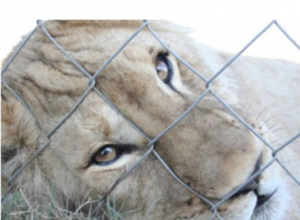News
Latest Lion Aid News
The spread of canned lion hunting?
Wednesday 28th November 2012
|
That’s a considerable sum just for the trophy fees alone. The breeders/operators are increasingly widening their earning capacity by allowing cub petting, attracting overseas (gullible) paying volunteers to have “animal” experiences, selling skins and claws, and exporting bones for the Asian Traditional Medicine market – records show that over those same five years South Africa exported 198 “bodies”, 250kg bones and 286 individual bones, 312 claws, 12 feet, 12 lion skin garments, 229 live animals, 178 skeletons, 180 skins, 229 skulls, and 153 teeth to foreign buyers. Clearly a lucrative business, and it now appears Botswana, Namibia and Zimbabwe are getting interested. Craig Boddington recently posted a message on a hunting site to mention that “… regrettably, and in contravention of local laws, there is some "releasing" of lions elsewhere, in both Namibia and Zimbabwe.” – in other words, captive bred lions from South Africa being transported to Namibia and Zimbabwe and set out for gullible trophy hunters. A reliable source mentions to us that dozens of lions have been imported into Zimbabwe for this reason – likely because wild lions in hunting concessions have been severely depopulated after years of unsustainable hunting levels. CITES records indicate that since 1980, 2979 lion trophies and 1512 skins were exported from Zimbabwe, and current lion population estimates indicate that fewer than 850 lions (both sexes and all ages) remain in the country – many of those in strictly protected areas. Botswana has also come under the radar in terms of some strange numbers on official CITES records. For example, over the five years from 2006 to 2010 (when reliable records end), records from Botswana indicate that they imported 11 live lions from South Africa and also exported 11 live lions to South Africa. However, South African records show that over that same period, 34 live lions were exported to Botswana and 34 live lions were imported back into South Africa. So while the net result seems to be zero, the difference in numbers quoted by Botswana and South Africa as well as the seemingly meaningless flow back and forth are suspicious. Botswana has had a lion trophy hunting moratorium in place since 2008, and Ian Michler, a reporter for the well-respected Africa Geographic magazine has long mentioned that lion breeding is now occuring on private farms. As these lions are privately owned, any hunting moratorium does not apply. Such private game farms seem concentrated in the northwestern part of Botswana, in the Ghanzi district. Interestingly, this is where the current Minister of Agriculture, Christian de Graf, hails from, and Ghanzi has long been an enclave of farmers originally from South Africa. Michler states “We already know that a government Minister from the region has been responsible for importing and exporting lions over the last few years.” We will enquire from the Botswana CITES authorities why these import/export numbers do not add up. Given that all trophy hunting on public land will cease in 2014, it would be highly inadvisable for the Botswana Government to allow canned hunting of lions to be established as a substitute. Tags: Botswana, CITES, Namibia, canned hunting, South Africa, Zimbabwe, lion trophies, game ranching, Categories: canned hunting/Captive breeding |
Posted by Pieter Kat at 14:25
No comments have been posted yet.
Add a new comment
Existing user
New user sign up




